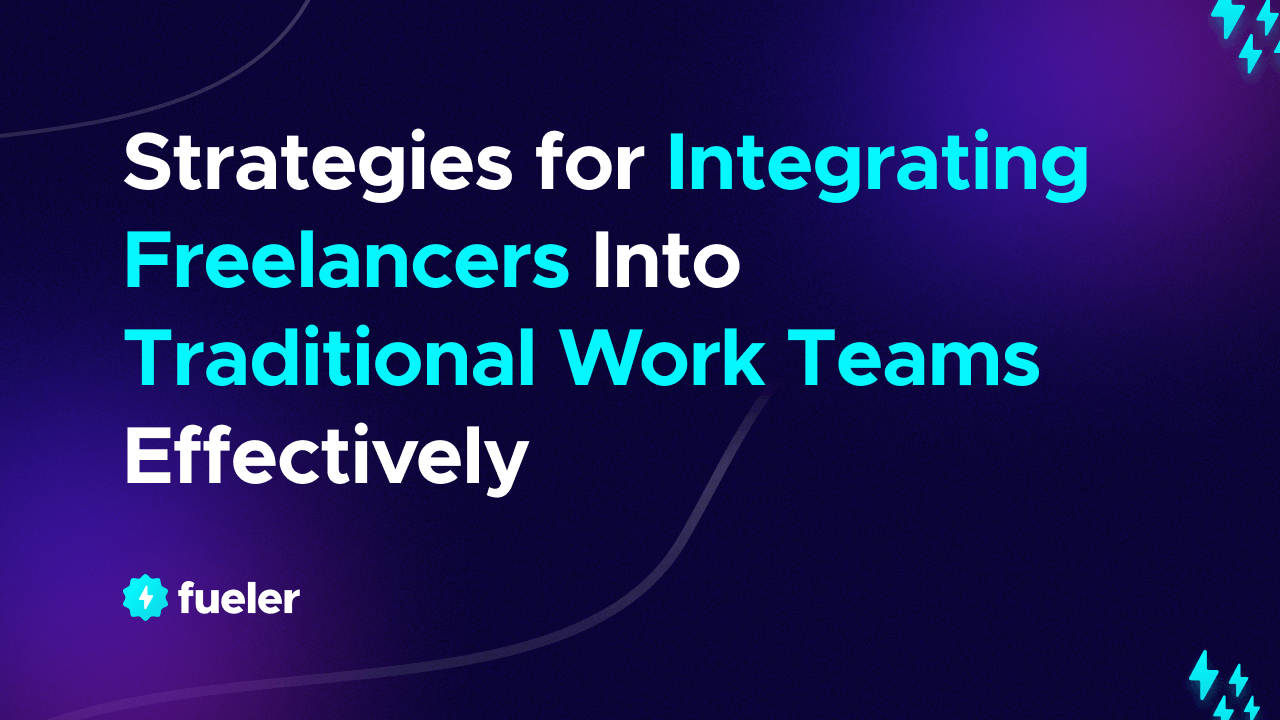Strategies for Integrating Freelancers Into Traditional Work Teams Effectively

Anshu
11 Jun, 2024

Table of contents
- Provide flexibility and autonomy
- Reflect their personal values
- Offer project-based roles
- Invest in professional development
- Benefits of integrating freelancers
Provide flexibility and autonomy
Freelancers choose this life because being able to control their schedules and work environment is something they cherish. Traditional companies can offer flexible working hours to fulfill this need for control. A flexible arrangement might also mean options for remote work and results-oriented performance rather than only clocking in and out. If employees are only judged on their output and not the time or location of completing their work, it will benefit the company as well.
Autonomy and flexibility are crucial, as the Great Resignation of 2022 showed. The latest data from Statista shows more than 50 million US workers took part in it, certain they would find higher salaries or better career opportunities elsewhere. Between November 2021 and April 2022, almost 4.5 million people in the US left their jobs each month, culminating in the peak of the Great Resignation.
The movement declined throughout 2023. Fewer than four million people quit their jobs between January and October 2023. The second-lowest reading since February 2021 was in November 2023, when 3.47 million US workers quit their jobs.
There are several different reasons why the movement is losing steam. Some companies have been able to integrate freelancers into traditional teams.
Reflect their personal values
Modern employees, especially younger people, want to work for companies that reflect their personal values. Companies that prioritize sustainability, inclusion, and diversity are more likely to appeal to freelancers who are looking for more than just a salary. Publicizing initiatives and results in these areas can make a traditional work team setting more attractive. For example, a business could highlight its active role in supporting local communities or commitment to reducing carbon emissions.
The oldest members of Gen Z have already spent some time in the job market. This generation made up roughly a fifth of the US population in 2020. As workplaces continue to evolve, Gen Z and Gen Alpha are shaping the future of work dynamics, particularly in how companies integrate freelancers into traditional teams. Just under 60% of these employees find the business they work for should take more environmental responsibility. To effectively engage this generation, consider leveraging tools like the kudos app to create a culture of recognition that aligns with their values, including environmental responsibility.
Offer project-based roles
Most freelancers like the diversity of working on various projects because it keeps their daily routines engaging and dynamic. Companies can appeal to them by creating temporary positions or project-based roles that let employees take part in specific initiatives with a clear duration. This approach offers employers the flexibility to scale labor as needed and fulfills the freelancer's need for variety.
A timesheet calculator makes the process of tracking time worked simple. This is especially important when people are working on different projects. It allows for error-free calculations, which is crucial for payroll. It also increases managers' productivity because they no longer need to calculate hours manually.
Invest in professional development
The most talented freelancers stay competitive by investing in their skills. Companies that offer regular workshops, solid training programs, and career advancement opportunities can draw independents to a traditional work team. As of 2024, companies with comprehensive formal training generate 218% higher revenues per employee than those without such. Giving freelancers the assurance that the company will invest in their training and development will attract them to the company. Stagnating is many freelancers' biggest fear.
The company could offer employees some sort of compensation to take job-related courses or attend relevant conferences.
Benefits of integrating freelancers
Integrating freelancers into traditional work teams offers significant benefits to both parties. Companies operating in volatile markets need to be able to scale workforce capabilities depending on project demands. Independent talent is a rich resource that helps meet business goals while reducing the costs associated with permanent staff.
Freelancers often bring innovative ideas and fresh perspectives to traditional teams. Companies can improve overall job satisfaction by focusing on professional development and adopting flexible work arrangements, leading to higher engagement and retention rates. At the beginning of 2024, 53% of respondents in a survey said they were likely to quit their current job, while 77% of surveyed employers found filling open positions challenging this year. There are 1.5 million fewer US workers in 2024 than in 2020.
Recap
Freelancers appreciate flexible work arrangements
Gen Z and millennials value sustainability and inclusivity
Freelancers want to work on different projects
They value professional growth
Companies that employ freelancers are better equipped to adapt to market conditions.
About Fueler:
Fueler is a career portfolio platform that helps companies find the best talents for their organization based on their proof of work
You can create your portfolio on Fueler, thousands of freelancers around the use Fueler to create their professional-looking portfolios and become financially independent. Discover inspiration for your portfolio
Sign up for free on Fueler or get in touch to learn more.


